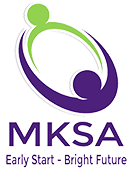If you are a parent or guardian of a child, you know the importance of regular doctor visits. In addition to the standard components of a visit, the American Academy of Pediatrics (AAP) recommends that pediatricians talk with families about their child’s development at every well-child visit between birth and 3 years old, and conduct developmental screenings at 9, 18 and 30 months of age.
During the first three years of a child’s life, their brain undergoes a remarkable period of development, and these years are considered the most important in a child’s development. These years are an important time for developmental monitoring and screening. According to Centers for Disease Control and Prevention (CDC), developmental monitoring observes how your child grows and changes over time and whether a child is meeting typical developmental milestones in playing, learning, speaking, behaving, and moving. A milestone checklist such as the one on MKSA’s website is a useful tool for this. All family members can participate in developmental monitoring. If you feel your child is not developing like other children of the same age, speak with your child’s pediatrician. At well-visits, doctors will do developmental monitoring and will ask you questions and will talk and play with your child. Childcare providers can also be a valuable source of information on your child’s development.
Developmental screening is a more in-depth look at your child’s development. Parents will complete a questionnaire about their child and your child may get a brief test. Screenings may be done by a doctor as well as other professionals in healthcare, early childhood education or school settings. Developmental screening is more formal and done less often than monitoring. Your child should be screened if you or your doctor have a concern, but developmental screening is a regular part of some well visits for all children. The AAP recommends developmental and behavioral screening for all children during well visits at the following ages: 9 months, 18 months, and 30 months. AAP also recommends that all children be screened specifically for autism spectrum disorder during well visits at 18 and 24 months. If your child is at a higher risk for developmental problems due to preterm birth, low birthweight, family history or other factors, your doctor may discuss additional screening.
Parents are sometimes hesitant about developmental screenings, believing that doctors are looking for problems. The opposite is often true. Parents—especially first-time parents—often have many questions about their child’s development. All aspects of a child’s development and life are considered, and doctors often reassure parents that behaviors and development are in fact typical. And if there is a concern, early help does make a difference.
If a developmental screening identifies an area of concern, a formal developmental evaluation may be suggested. An evaluation will identify and diagnose developmental delays and conditions and determine if a child is eligible for early intervention services. A developmental delay means a child has not reached age-appropriate milestones in one or more developmental areas. If the delay is significant enough to meet eligibility criteria, early intervention services are available at no out-of-pocket cost. To learn more about this, click here.
Many families have delayed well-child visits due to the pandemic, resulting in missed screenings. Schedules were altered, and ‘getting back to normal’ should include resuming regular checkups for children. Many milestones can only be measured by doctors in person. Parents can also discuss any concerns they may have about their child, and receive guidance, and resources if necessary. If well-visits were missed, now is the time to reconnect with your child’s doctor and discuss any concerns.
If you have any questions about your child’s development, MKSA is here to answer your questions. Please reach out by email at info@mksallc.org or call 516-731-5588.
Note: The information in this article is for informational purposes only. It is not an attempt to diagnose or treat any medical condition. Always consult your child’s pediatrician with any specific medical questions. MKSA is also available to answer questions about child development. Contact us at 516-731-5588 or www.mksallc.com.
Sources:
https://cdc.gov Developmental Monitoring and Screening
https://aap.org Developmental Screening
